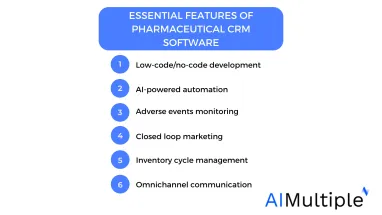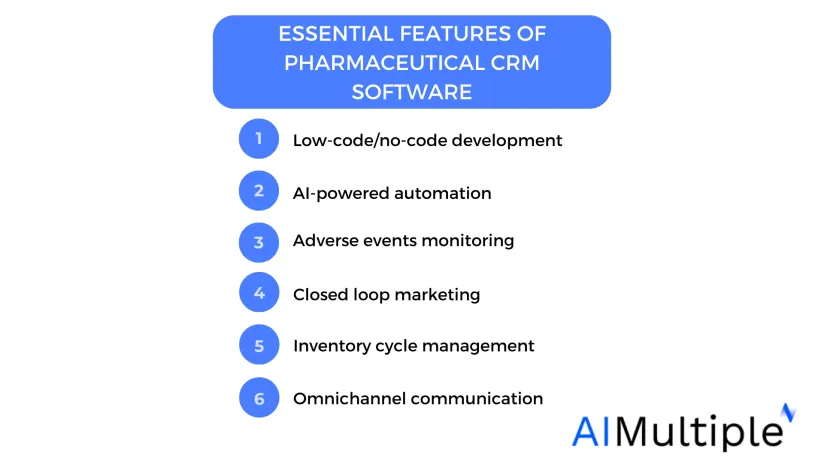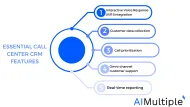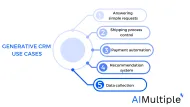Top 8 Pharma CRM Software in 2024: Vendor Selection Guide


The pharmaceutical industry is undergoing rapid transformations with the development of AI-powered systems. Recent research shows that 80% of biopharma leaders plan to quicken digital transformation within their company to keep up with recent developments such as algorithm designed drugs or accelerated medicine design processes.1 Customer Relationship Management software helps pharmaceutical companies foster this digital transformation by automating repetitive tasks, managing documents, and providing advanced reports and analytics.
In this article, we provide business leaders with a benchmarking on the available pharma CRM platforms in the market. So, businesses can make informed choices in their vendor selection process and find the right pharmaceutical CRM software for their business.
8 Pharma Customer Relationship Management (CRM) software benchmarking
| Vendors list | Employee size | Number of reviews* | Ratings | Free trial | Pricing |
|---|---|---|---|---|---|
| Pipedrive | 970 | 4,960 | 4.25/5 | ✅ | Starts from $14.90 / month per user |
| Creatio | 673 | 404 | 4.6/5 | ✅ | Starts from $25 / month per user |
| Freshsales | 7,870 | 6,574 | 4.4/5 | ✅ | Starts from $15 / month per user |
| Hubspot Marketing Hub | 9,191 | 18,055 | 4.4/5 | ✅ | Starts from $45 / month per user |
| Scilife | 74 | 81 | 4.4/5 | ✅ | Not provided |
| Veeva CRM | 7,940 | 62 | 4.1/5 | ✖ | Starts from $200 / month |
| Vtiger | 177 | 773 | 4.2/5 | ✅ | Starts from $30 / month per user |
| Zoho CRM | 18,994 | 9,724 | 4.15/5 | ✅ | Starts from $14 / month per user |
*Ratings are derived from the average scores on software review platforms G2, Capterra, and Trustradius.
For those interested, here is our CRM pricing guide.
| Vendors list | Low-code/no-code development | AI-powered automation | Adverse events monitoring | Closed loop marketing | Inventory cycle management | Omnichannel communication |
|---|---|---|---|---|---|---|
| Pipedrive | ✅ | ✅ | ✖ | ✖ | ✅ | Email Live chat Zoom |
| Creatio | ✅ | ✅ | ✅ | ✅ | ✅ | Email Live chat 24/7 SMS Phone Zoom |
| Freshsales | ✖ | ✅ | ✖ | ✅ | ✖ | Email Live chat SMS Phone Zoom |
| Hubspot Marketing Hub | Not provided | ✅ | ✖ | ✅ | ✅ | Email Live chat Phone |
| Scilife | ✖ | ✖ | ✖ | ✖ | ✖ | Community Knowledge base |
| Veeva CRM | Not provided | ✅ | ✅ | ✅ | ✅ | Email Knowledge base |
| Vtiger | Low-code | ✅ | ✖ | ✖ | ✅ | Email Live chat Phone |
| Zoho CRM | ✅ | ✅ | ✖ | ✖ | ✅ | Email Phone SMS Live chat |
Vendor selection criteria
As there are various vendors offering pharma CRM software tools, we narrowed down our benchmarking based on certain criteria, such as the number of B2B reviews. We selected these criteria as they are public and verifiable through vendors’ websites or software review platforms. We included companies with:
- 50+ employees
- 60+ reviews on software review platforms such as G2, Capterra, and Trustradius.
Disclaimer:
The data is gathered from the websites of vendors or the software review platforms (i.e., ratings). Please keep in mind that some vendors provide a variety of services (e.g., Hubspot), while some are only focused on CRM. That’s why, both their company size and the number of reviews may differ. If you believe we have missed any vendor or any feature, please contact us so that we can consider adding it to our article.
Transparency statement: AIMultiple serves numerous emerging tech companies which received links from this article.
> Essential Features of Pharmaceutical CRM Software
The pharma industry has specific needs that differ from other sectors. As such, pharma CRM software often comes with tailored features. Here are some of the most common features to look out for in a CRM solution:
1- Low-code/no-code development
Technical complexities inside a CRM system might result in delayed answers to customer-related issues, as users frequently demand IT assistance for solutions. Low-code/no-code development allows pharmaceutical companies to tweak and customize their CRM platforms with minimal IT intervention. This means quicker adaptations to new regulations, faster response to market changes and customer issues, and a CRM that grows with the company’s needs.
For more on no-code CRM systems and use cases, check out our article.
2- AI-powered automation
The pharmaceutical world is data-rich, from clinical trials to patient feedback. AI-powered automation in CRM systems can analyze this vast data, identifying patterns and insights that might be missed by the human eye. AI-powered data analytics can provide market demand predictions, sales strategies, and even flag potential adverse reactions faster than traditional methods.
3- Adverse events monitoring
Patient safety is one of the most critical requirements in the pharmaceutical industry. A robust CRM system should have a dedicated module for tracking and managing reported side effects or negative reactions to medications. This not only ensures timely interventions but also aids in regulatory compliance, as companies can quickly generate reports for health authorities.
4- Closed loop marketing
The journey from drug development to market release is long and complex. Closed-loop marketing in CRM systems provides pharmaceutical companies with feedback mechanisms at every stage. By tracking the effectiveness of marketing campaigns in real-time, companies can refine their strategies, ensuring that the right audience is reached with the most impactful message.
5- Inventory cycle management
With medications having strict storage requirements and limited shelf lives, managing inventory is critical. CRM systems with advanced inventory cycle management can monitor stock levels, predict demand based on historical data, and even send alerts for replenishments. This ensures that there’s never an overstock or shortage, optimizing storage costs and ensuring timely deliveries.
6- Omnichannel communication
In the modern age, patients and healthcare providers interact across multiple channels, from emails to phone calls to Twitter mentions. An effective CRM system consolidates these customer interactions in different channels, ensuring that customer queries are addressed efficiently, and no feedback is lost. This unified approach enhances customer experience and ensures that companies remain responsive and accessible. Customer data then can be used to analyze sentiment to take necessary actions.
For more on sentiment analysis, check out our article.
Further Reading
- Healthcare CRM Systems: Benefits, Key Features & Suggestions
- Top 10 Healthcare CRM Software for Hospitals & Medical Doctors
- 5 Use Cases/Applications of Medical Sentiment Analysis in 2023
If you need guidance in your vendor selection process, contact us:
External Links
- 1. “2023 Global Life Sciences Outlook” (PDF). Deloitte. Retrieved July 26, 2023.

Cem has been the principal analyst at AIMultiple since 2017. AIMultiple informs hundreds of thousands of businesses (as per similarWeb) including 60% of Fortune 500 every month.
Cem's work has been cited by leading global publications including Business Insider, Forbes, Washington Post, global firms like Deloitte, HPE, NGOs like World Economic Forum and supranational organizations like European Commission. You can see more reputable companies and media that referenced AIMultiple.
Throughout his career, Cem served as a tech consultant, tech buyer and tech entrepreneur. He advised businesses on their enterprise software, automation, cloud, AI / ML and other technology related decisions at McKinsey & Company and Altman Solon for more than a decade. He also published a McKinsey report on digitalization.
He led technology strategy and procurement of a telco while reporting to the CEO. He has also led commercial growth of deep tech company Hypatos that reached a 7 digit annual recurring revenue and a 9 digit valuation from 0 within 2 years. Cem's work in Hypatos was covered by leading technology publications like TechCrunch and Business Insider.
Cem regularly speaks at international technology conferences. He graduated from Bogazici University as a computer engineer and holds an MBA from Columbia Business School.
To stay up-to-date on B2B tech & accelerate your enterprise:
Follow on

Comments
Your email address will not be published. All fields are required.